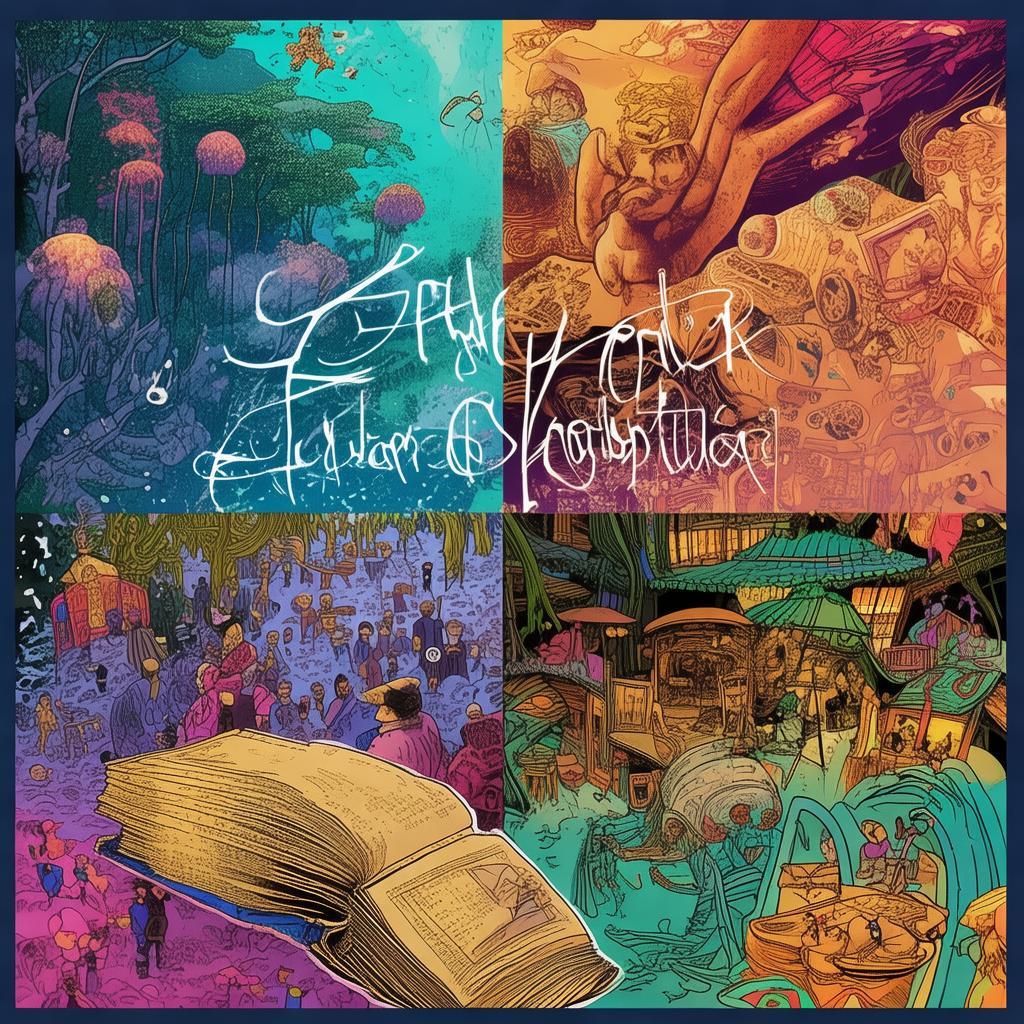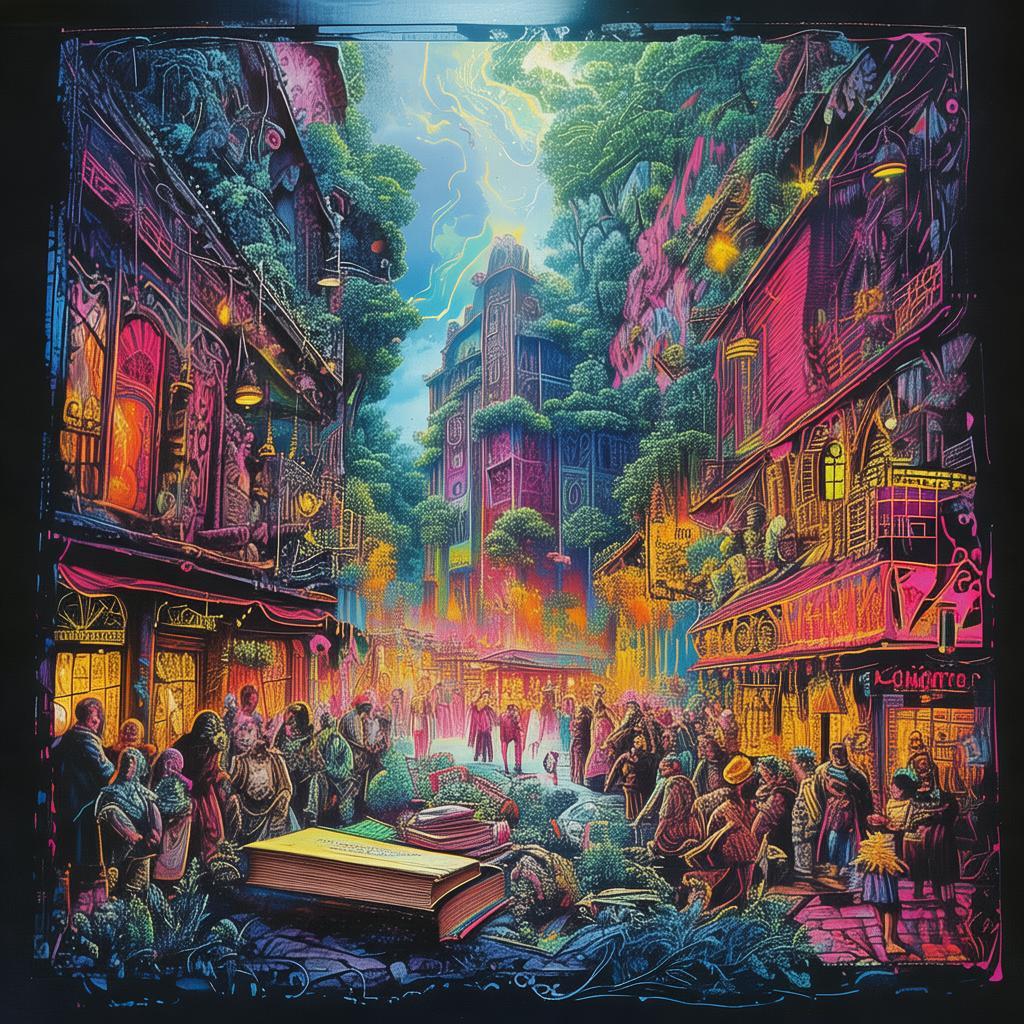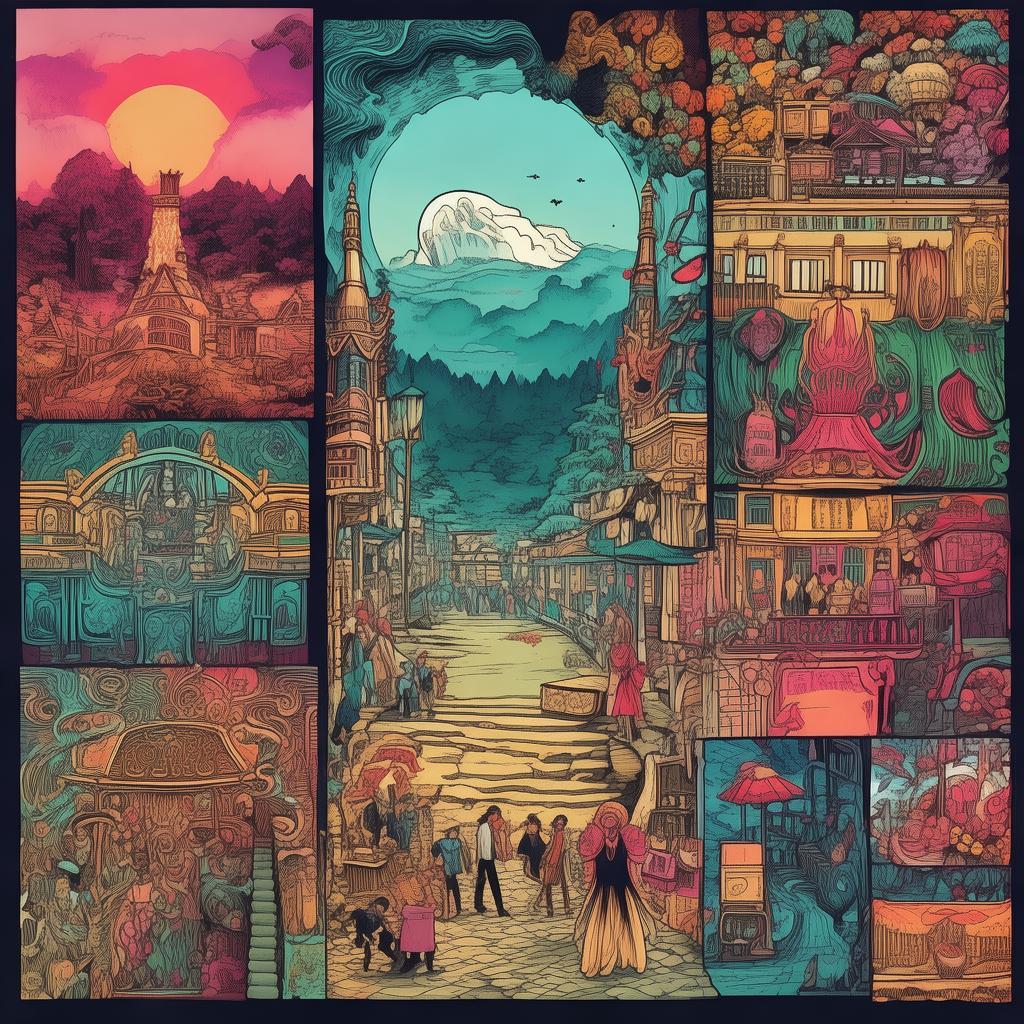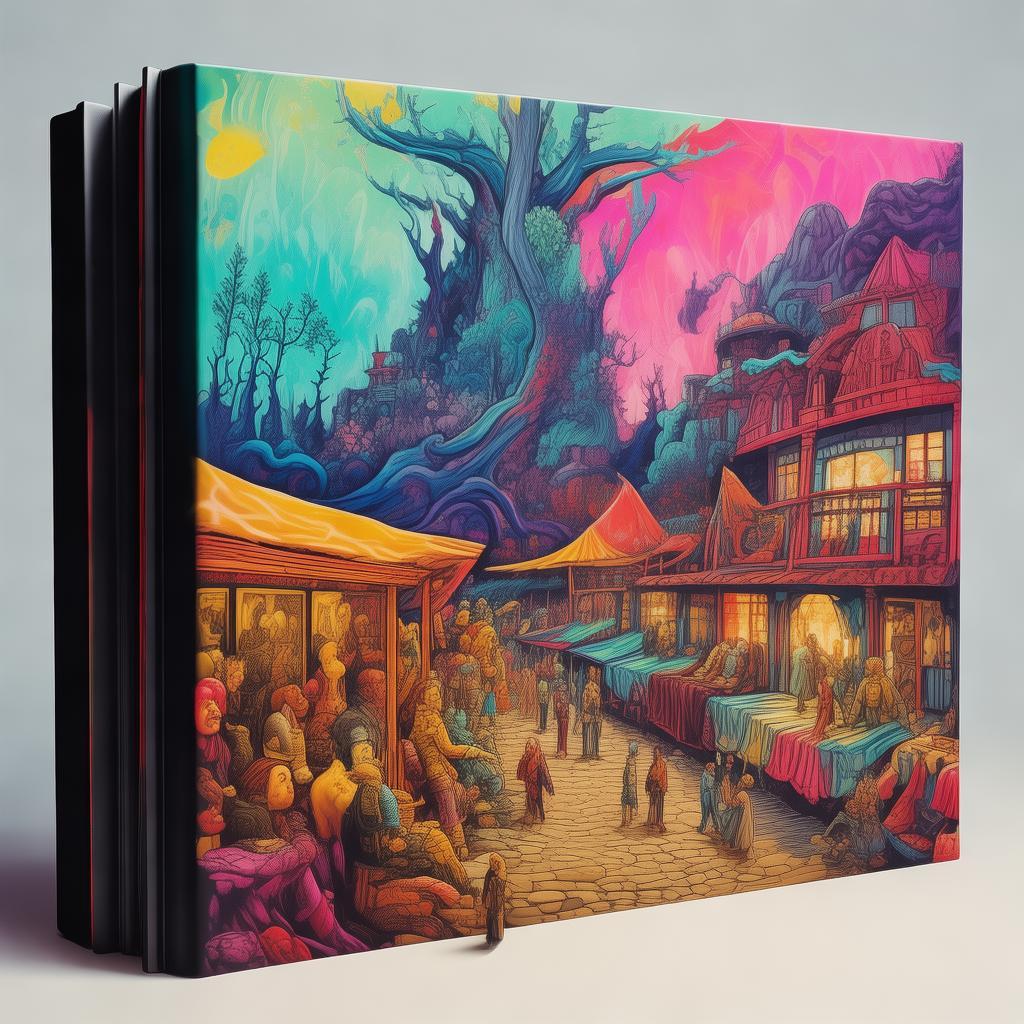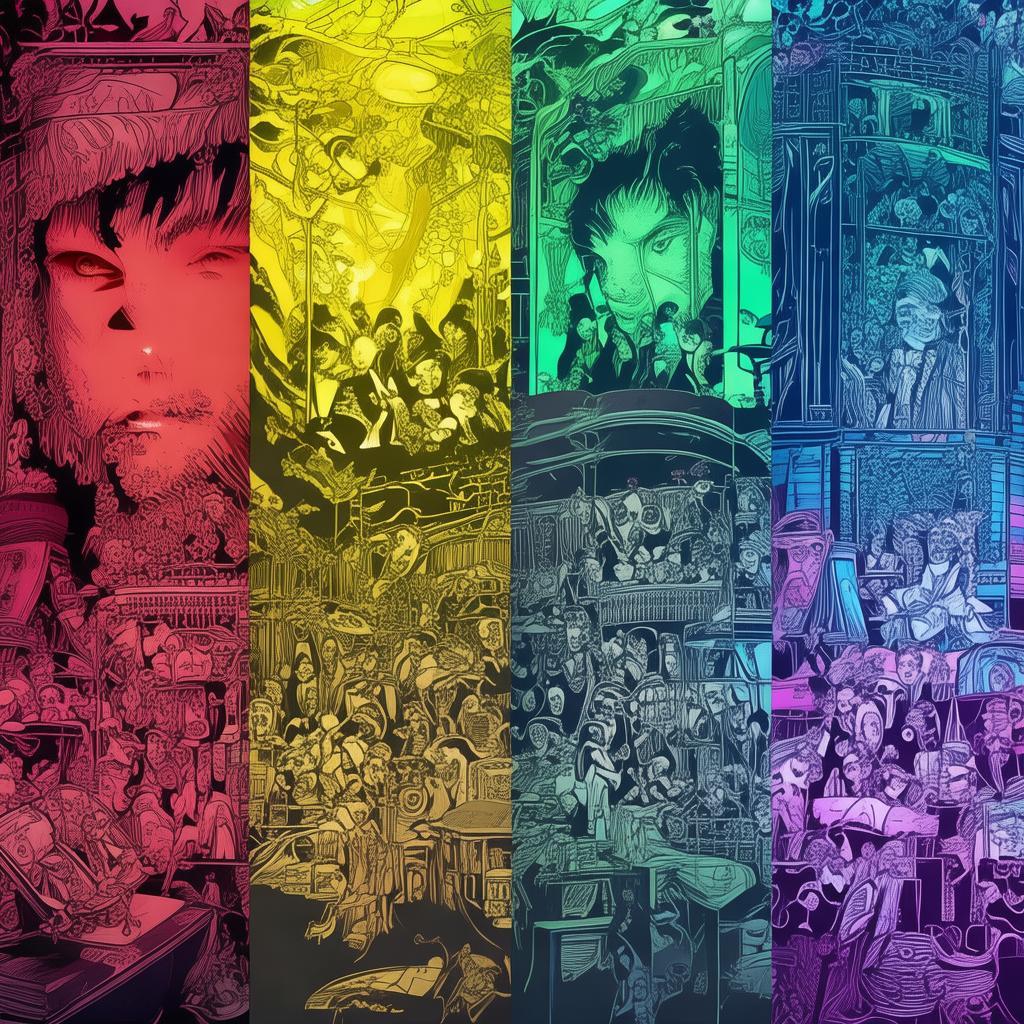Whispers of the Heart: A Love Unveiled
The rain had ceased its relentless pounding, leaving the city draped in a shroud of mist. The old, creaky door of the rundown apartment building creaked open, revealing a young woman named Elara. She stepped out, her eyes scanning the overgrown pathway that led to a small, forgotten garden at the back of the building. The air was thick with the scent of roses, but the garden was silent, save for the distant hum of traffic.
Elara had always been drawn to the garden, a place she had visited as a child, but had not returned to in years. Today, something felt different. She felt a strange pull, as if the garden itself was calling her.
As she approached, she noticed a small, ornate box half-buried in the soil. Her curiosity piqued, she knelt down and unearthed it. The box was intricately carved, and she could feel the weight of its secrets pressing against her fingers. With trembling hands, she opened it and found a locket containing a photograph of her and a man she had never seen before, but whose face seemed to resonate with a familiar warmth.

The photograph was dated, and the man was wearing a uniform from decades past. Elara's heart raced as she realized that the man in the photo was her father, a man she had never known. The locket was his, and it had been left in the garden all these years. But why?
Determined to uncover the truth, Elara delved deeper into the garden's mysteries. She discovered a series of letters hidden in the walls, each one a piece of her father's life, a man she had never known. The letters spoke of love, of a woman who had once been his, and of a child he had lost.
As she read, Elara's emotions swirled in a whirlwind of confusion and pain. She learned that her father had loved a woman named Isabella, who had given birth to her but had died shortly after. The letters revealed that her father had loved her deeply, but his life had been torn apart by guilt and sorrow.
Elara's own mother had been a nurse who had taken care of her father in his time of need. She had fallen in love with him, and together, they had tried to rebuild their lives. But the shadow of Isabella's death had cast a long, dark shadow over their relationship.
The letters spoke of Isabella's last words, a whispered promise that she would never leave her child. Elara realized that her father had kept this promise, even if it had meant a lifetime of silence and separation.
As Elara sat in the garden, the realization hit her like a ton of bricks. She was Isabella's daughter, the child of a love that had been lost and hidden away in the garden. The garden was her father's love, a love that had been kept alive through the letters and the locket.
The garden, once a silent witness to a love story, now became Elara's sanctuary. She spent hours there, reading the letters, feeling the weight of her father's love. She began to understand the complexity of her own emotions, the pain of loss, and the joy of discovery.
One evening, as she sat by the garden's pond, she heard a soft whisper. She turned to see an elderly man standing before her. His eyes were kind, and he introduced himself as Mr. Whitaker, the man who had lived in the apartment building for decades.
He revealed that he had been the one who had planted the garden, had hidden the letters, and had kept the secret of Elara's true identity. Mr. Whitaker had been Isabella's confidant, her friend, and had loved her as his own daughter.
Elara and Mr. Whitaker spent hours talking, sharing stories, and healing old wounds. Mr. Whitaker had watched over the garden, ensuring that it remained a place of solace and love.
As the days passed, Elara felt a shift within herself. She began to embrace the love her father had given her, even if it had been through letters and photographs. She realized that love was not about the presence of a person, but about the presence of their spirit.
The garden became a place of remembrance, a place where Elara could honor her father's memory and the love he had carried with him. She planted a rose bush in the center of the garden, a symbol of her connection to her past and to the man who had loved her so deeply.
One evening, as she stood in the garden, Elara felt a presence beside her. She turned to see a young woman, a woman who looked exactly like her. The woman smiled, and Elara knew that she was Isabella, her mother, reaching out from the garden of love.
Elara and Isabella shared a silent moment, a moment of connection and understanding. The garden, once a place of mystery and sorrow, now stood as a testament to the enduring power of love.
The garden became Elara's sanctuary, a place where she could come to terms with her past and embrace her future. She realized that love was not just a feeling, but a choice, a choice to carry on the legacy of those who had loved her before her.
And so, Elara stood in the garden, surrounded by the whispers of the past, the echoes of love, and the promise of a future filled with her own love to give.
The garden, once a silent witness to a love story, now became Elara's sanctuary. She spent hours there, reading the letters, feeling the weight of her father's love. She began to understand the complexity of her own emotions, the pain of loss, and the joy of discovery.
One evening, as she sat by the garden's pond, she heard a soft whisper. She turned to see an elderly man standing before her. His eyes were kind, and he introduced himself as Mr. Whitaker, the man who had lived in the apartment building for decades.
He revealed that he had been the one who had planted the garden, had hidden the letters, and had kept the secret of Elara's true identity. Mr. Whitaker had been Isabella's confidant, her friend, and had loved her as his own daughter.
Elara and Mr. Whitaker spent hours talking, sharing stories, and healing old wounds. Mr. Whitaker had watched over the garden, ensuring that it remained a place of solace and love.
As the days passed, Elara felt a shift within herself. She began to embrace the love her father had given her, even if it had been through letters and photographs. She realized that love was not about the presence of a person, but about the presence of their spirit.
The garden became a place of remembrance, a place where Elara could honor her father's memory and the love he had carried with him. She planted a rose bush in the center of the garden, a symbol of her connection to her past and to the man who had loved her so deeply.
One evening, as she stood in the garden, Elara felt a presence beside her. She turned to see a young woman, a woman who looked exactly like her. The woman smiled, and Elara knew that she was Isabella, her mother, reaching out from the garden of love.
Elara and Isabella shared a silent moment, a moment of connection and understanding. The garden, once a place of mystery and sorrow, now stood as a testament to the enduring power of love.
The garden became Elara's sanctuary, a place where she could come to terms with her past and embrace her future. She realized that love was not just a feeling, but a choice, a choice to carry on the legacy of those who had loved her before her.
And so, Elara stood in the garden, surrounded by the whispers of the past, the echoes of love, and the promise of a future filled with her own love to give.
The garden, once a silent witness to a love story, now became Elara's sanctuary. She spent hours there, reading the letters, feeling the weight of her father's love. She began to understand the complexity of her own emotions, the pain of loss, and the joy of discovery.
One evening, as she sat by the garden's pond, she heard a soft whisper. She turned to see an elderly man standing before her. His eyes were kind, and he introduced himself as Mr. Whitaker, the man who had lived in the apartment building for decades.
He revealed that he had been the one who had planted the garden, had hidden the letters, and had kept the secret of Elara's true identity. Mr. Whitaker had been Isabella's confidant, her friend, and had loved her as his own daughter.
Elara and Mr. Whitaker spent hours talking, sharing stories, and healing old wounds. Mr. Whitaker had watched over the garden, ensuring that it remained a place of solace and love.
As the days passed, Elara felt a shift within herself. She began to embrace the love her father had given her, even if it had been through letters and photographs. She realized that love was not about the presence of a person, but about the presence of their spirit.
The garden became a place of remembrance, a place where Elara could honor her father's memory and the love he had carried with him. She planted a rose bush in the center of the garden, a symbol of her connection to her past and to the man who had loved her so deeply.
One evening, as she stood in the garden, Elara felt a presence beside her. She turned to see a young woman, a woman who looked exactly like her. The woman smiled, and Elara knew that she was Isabella, her mother, reaching out from the garden of love.
Elara and Isabella shared a silent moment, a moment of connection and understanding. The garden, once a place of mystery and sorrow, now stood as a testament to the enduring power of love.
The garden became Elara's sanctuary, a place where she could come to terms with her past and embrace her future. She realized that love was not just a feeling, but a choice, a choice to carry on the legacy of those who had loved her before her.
And so, Elara stood in the garden, surrounded by the whispers of the past, the echoes of love, and the promise of a future filled with her own love to give.
The garden, once a silent witness to a love story, now became Elara's sanctuary. She spent hours there, reading the letters, feeling the weight of her father's love. She began to understand the complexity of her own emotions, the pain of loss, and the joy of discovery.
One evening, as she sat by the garden's pond, she heard a soft whisper. She turned to see an elderly man standing before her. His eyes were kind, and he introduced himself as Mr. Whitaker, the man who had lived in the apartment building for decades.
He revealed that he had been the one who had planted the garden, had hidden the letters, and had kept the secret of Elara's true identity. Mr. Whitaker had been Isabella's confidant, her friend, and had loved her as his own daughter.
Elara and Mr. Whitaker spent hours talking, sharing stories, and healing old wounds. Mr. Whitaker had watched over the garden, ensuring that it remained a place of solace and love.
As the days passed, Elara felt a shift within herself. She began to embrace the love her father had given her, even if it had been through letters and photographs. She realized that love was not about the presence of a person, but about the presence of their spirit.
The garden became a place of remembrance, a place where Elara could honor her father's memory and the love he had carried with him. She planted a rose bush in the center of the garden, a symbol of her connection to her past and to the man who had loved her so deeply.
One evening, as she stood in the garden, Elara felt a presence beside her. She turned to see a young woman, a woman who looked exactly like her. The woman smiled, and Elara knew that she was Isabella, her mother, reaching out from the garden of love.
Elara and Isabella shared a silent moment, a moment of connection and understanding. The garden, once a place of mystery and sorrow, now stood as a testament to the enduring power of love.
The garden became Elara's sanctuary, a place where she could come to terms with her past and embrace her future. She realized that love was not just a feeling, but a choice, a choice to carry on the legacy of those who had loved her before her.
And so, Elara stood in the garden, surrounded by the whispers of the past, the echoes of love, and the promise of a future filled with her own love to give.
The garden, once a silent witness to a love story, now became Elara's sanctuary. She spent hours there, reading the letters, feeling the weight of her father's love. She began to understand the complexity of her own emotions, the pain of loss, and the joy of discovery.
One evening, as she sat by the garden's pond, she heard a soft whisper. She turned to see an elderly man standing before her. His eyes were kind, and he introduced himself as Mr. Whitaker, the man who had lived in the apartment building for decades.
He revealed that he had been the one who had planted the garden, had hidden the letters, and had kept the secret of Elara's true identity. Mr. Whitaker had been Isabella's confidant, her friend, and had loved her as his own daughter.
Elara and Mr. Whitaker spent hours talking, sharing stories, and healing old wounds. Mr. Whitaker had watched over the garden, ensuring that it remained a place of solace and love.
As the days passed, Elara felt a shift within herself. She began to embrace the love her father had given her, even if it had been through letters and photographs. She realized that love was not about the presence of a person, but about the presence of their spirit.
The garden became a place of remembrance, a place where Elara could honor her father's memory and the love he had carried with him. She planted a rose bush in the center of the garden, a symbol of her connection to her past and to the man who had loved her so deeply.
One evening, as she stood in the garden, Elara felt a presence beside her. She turned to see a young woman, a woman who looked exactly like her. The woman smiled, and Elara knew that she was Isabella, her mother, reaching out from the garden of love.
Elara and Isabella shared a silent moment, a moment of connection and understanding. The garden, once a place of mystery and sorrow, now stood as a testament to the enduring power of love.
The garden became Elara's sanctuary, a place where she could come to terms with her past and embrace her future. She realized that love was not just a feeling, but a choice, a choice to carry on the legacy of those who had loved her before her.
And so, Elara stood in the garden, surrounded by the whispers of the past, the echoes of love, and the promise of a future filled with her own love to give.
The garden, once a silent witness to a love story, now became Elara's sanctuary. She spent hours there, reading the letters, feeling the weight of her father's love. She began to understand the complexity of her own emotions, the pain of loss, and the joy of discovery.
One evening, as she sat by the garden's pond, she heard a soft whisper. She turned to see an elderly man standing before her. His eyes were kind, and he introduced himself as Mr. Whitaker, the man who had lived in the apartment building for decades.
He revealed that he had been the one who had planted the garden, had hidden the letters, and had kept the secret of Elara's true identity. Mr. Whitaker had been Isabella's confidant, her friend, and had loved her as his own daughter.
Elara and Mr. Whitaker spent hours talking, sharing stories, and healing old wounds. Mr. Whitaker had watched over the garden, ensuring that it remained a place of solace and love.
As the days passed, Elara felt a shift within herself. She began to embrace the love her father had given her, even if it had been through letters and photographs. She realized that love was not about the presence of a person, but about the presence of their spirit.
The garden became a place of remembrance, a place where Elara could honor her father's memory and the love he had carried with him. She planted a rose bush in the center of the garden, a symbol of her connection to her past and to the man who had loved her so deeply.
One evening, as she stood in the garden, Elara felt a presence beside her. She turned to see a young woman, a woman who looked exactly like her. The woman smiled, and Elara knew that she was Isabella, her mother, reaching out from the garden of love.
Elara and Isabella shared a silent moment, a moment of connection and understanding. The garden, once a place of mystery and sorrow, now stood as a testament to the enduring power of love.
The garden became Elara's sanctuary, a place where she could come to terms with her past and embrace her future. She realized that love was not just a feeling, but a choice, a choice to carry on the legacy of those who had loved her before her.
And so, Elara stood in the garden, surrounded by the whispers of the past, the echoes of love, and the promise of a future filled with her own love to give.
The garden, once a silent witness to a love story, now became Elara's sanctuary. She spent hours there, reading the letters, feeling the weight of her father's love. She began to understand the complexity of her own emotions, the pain of loss, and the joy of discovery.
One evening, as she sat by the garden's pond, she heard a soft whisper. She turned to see an elderly man standing before her. His eyes were kind, and he introduced himself as Mr. Whitaker, the man who had lived in the apartment building for decades.
He revealed that he had been the one who had planted the garden, had hidden the letters, and had kept the secret of Elara's true identity. Mr. Whitaker had been Isabella's confidant, her friend, and had loved her as his own daughter.
Elara and Mr. Whitaker spent hours talking, sharing stories, and healing old wounds. Mr. Whitaker had watched over the garden, ensuring that it remained a place of solace and love.
As the days passed, Elara felt a shift within herself. She began to embrace the love her father had given her, even if it had been through letters and photographs. She realized that love was not about the presence of a person, but about the presence of their spirit.
The garden became a place of remembrance, a place where Elara could honor her father's memory and the love he had carried with him. She planted a rose bush in the center of the garden,
✨ Original Statement ✨
All articles published on this website (including but not limited to text, images, videos, and other content) are original or authorized for reposting and are protected by relevant laws. Without the explicit written permission of this website, no individual or organization may copy, modify, repost, or use the content for commercial purposes.
If you need to quote or cooperate, please contact this site for authorization. We reserve the right to pursue legal responsibility for any unauthorized use.
Hereby declared.
